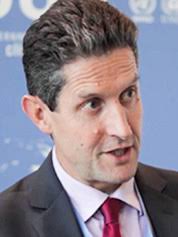Speaker Myles Allen: Direct air capture of CO2
- Start Tuesday 22 May 2018 6:00pm
- Finish Tuesday 22 May 2018 8:00pm

Direct air capture of CO2 — what’s it got to do with energy policy?
Everything, really — and this is a problem, because most people who think about energy policy see air-capture as a futuristic and largely hypothetical distraction. But the cumulative impact of carbon dioxide emissions means there is a high chance that much of the CO2 generated by fossil energy production today will need to be scrubbed back out of the atmosphere in the future if our long-term climate goals are to be met. So the development of air-capture is implicit in almost all ambitious climate mitigation scenarios, and no-one has worked out how it will happen, and most important of all, how it will be paid for. We will present modelling results that indicate that traditional carbon pricing mechanisms are very unlikely to build up a CO2-disposal industry on anything close to the speed and scale required, even in a country with relatively progressive climate policies and ample disposal resources like the UK. The only way of securing the resources for the development of large-scale air capture without the moral hazard of encouraging present-day emissions is to make large-scale CO2 disposal a licensing requirement of the continued extraction and sale of fossil fuels. Such a scheme would be surprisingly affordable in the near term, and have significant co-benefits for other aspects of energy policy. Myles Allen will be joined by Matthew Ives from INET.
Speaker
Myles Allen is Professor of Geosystem Science in the Environmental Change Institute, School of Geography and the Environment and Department of Physics, University of Oxford, and co-Director of the Oxford Martin Net Zero Carbon Investment Initiative. His research focuses on howhuman and natural influences on climate contribute to observed climate change and risks of extreme weather and in quantifying their implications for long-range climate forecasts. He is currently a Coordinating Lead Author onthe Intergovernmental Panel on Climate Change Special Report on 1.5 degrees, having served on the IPCC’s 3rd, 4th and 5th Assessments, including the Synthesis Report Core Writing Team in 2014. In 2010 he was awarded the Appleton Medal and Prize from the Institute of Physics “for his important contributions to the detection and attribution of human influence on climate and quantifying uncertainty in climate predictions.”

